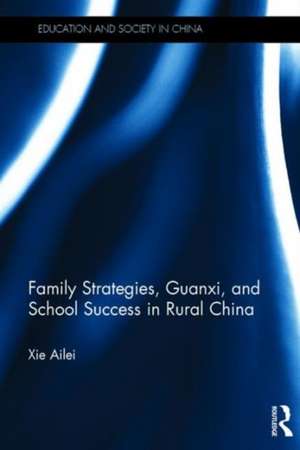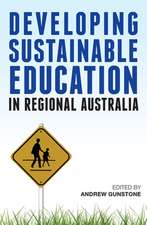Family Strategies, Guanxi, and School Success in Rural China: Education and Society in China
Autor Ailei Xieen Limba Engleză Hardback – 26 apr 2016
Chapters include:
- Family Strategies, Parental Involvement, and School Success
- The Roles of Parents: Voices of Parents in Zong Regarding School Involvement
- Policy Discourses: Missing the Link between Family and School
- Peasants: Family and Kinship
- The Blurring Division between Home and School
Din seria Education and Society in China
-
 Preț: 303.06 lei
Preț: 303.06 lei - 14%
 Preț: 305.97 lei
Preț: 305.97 lei - 14%
 Preț: 318.90 lei
Preț: 318.90 lei -
 Preț: 309.69 lei
Preț: 309.69 lei - 15%
 Preț: 289.58 lei
Preț: 289.58 lei - 17%
 Preț: 251.78 lei
Preț: 251.78 lei -
 Preț: 370.55 lei
Preț: 370.55 lei -
 Preț: 369.58 lei
Preț: 369.58 lei - 17%
 Preț: 251.10 lei
Preț: 251.10 lei -
 Preț: 341.48 lei
Preț: 341.48 lei -
 Preț: 376.37 lei
Preț: 376.37 lei -
 Preț: 376.37 lei
Preț: 376.37 lei - 17%
 Preț: 251.63 lei
Preț: 251.63 lei - 19%
 Preț: 253.20 lei
Preț: 253.20 lei - 18%
 Preț: 999.51 lei
Preț: 999.51 lei - 17%
 Preț: 253.11 lei
Preț: 253.11 lei -
 Preț: 376.10 lei
Preț: 376.10 lei - 18%
 Preț: 1002.18 lei
Preț: 1002.18 lei - 18%
 Preț: 1004.34 lei
Preț: 1004.34 lei -
 Preț: 376.37 lei
Preț: 376.37 lei - 18%
 Preț: 1000.27 lei
Preț: 1000.27 lei - 18%
 Preț: 1000.27 lei
Preț: 1000.27 lei
Preț: 817.87 lei
Preț vechi: 1101.58 lei
-26% Nou
Puncte Express: 1227
Preț estimativ în valută:
156.50€ • 163.40$ • 129.52£
156.50€ • 163.40$ • 129.52£
Carte tipărită la comandă
Livrare economică 04-18 aprilie
Preluare comenzi: 021 569.72.76
Specificații
ISBN-13: 9781138841062
ISBN-10: 1138841064
Pagini: 142
Ilustrații: 8
Dimensiuni: 156 x 234 x 18 mm
Greutate: 0.34 kg
Ediția:1
Editura: Taylor & Francis
Colecția Routledge
Seria Education and Society in China
Locul publicării:Oxford, United Kingdom
ISBN-10: 1138841064
Pagini: 142
Ilustrații: 8
Dimensiuni: 156 x 234 x 18 mm
Greutate: 0.34 kg
Ediția:1
Editura: Taylor & Francis
Colecția Routledge
Seria Education and Society in China
Locul publicării:Oxford, United Kingdom
Public țintă
Postgraduate and ProfessionalCuprins
Chapter 1: Introduction 1.1 Rural Children and School Success in the Market Transitional Era 1.2 Parental Involvement and Social Class 1.3 Capital, Guanxi and Inequality 1.4 Research Methodology 1.5 About this book Chapter 2: The Social Connections Between Home and School: The Institutional Hole 2.1 Introduction 2.2 Toward Social-Capital Conversion: Parents‘ Voice About School Involvement 2.2.1 Material and Emotional Supports 2.2.2 Managing 2.2.3 Tutoring 2.2.4 Knowing the Academic Scores 2.2.5 School Choice 2.3 Trinity Become One Force: Missing the Linkages Between Family and School 2.3.1 Trinity Become One Force: The Interdependence of Family and School 2.3.2 Vague Ways: The Separation of Family and School 2.4 Restricted Access to Schooling: Teachers‘ Voices About Parental Involvement 2.4.1 Marginalized Roles: The Perceived Importance of Parent by Teachers in Schooling 2.4.2 Limited Inter-Connectedness: Formal Channels for Parents to get Involved 2.5 Conclusion Chapter 3: Parents‘ Strategies: Guanxi as a Response 3.1 Introduction 3.2 Peasant: Relying on Teachers and the Strong Ties Within Families 3.2.1 Relying on Teachers 3.2.2 Skipped Generational Raising 3.2.3 Kinships and Relatives 3.3 Cadre and Professional: Reproducing Strong Ties With Colleagues 3.3.1 Family and Community 3.3.2 Colleagues and Friends 3.4 The New Economic Elites: Reproducing Interpersonal Ties with Teachers 3.4.1 Peidu (accompany studying) 3.4.2 Giving Gifts and Hosting Banquets for Teachers 3.5 Conclusion Chapter 4: Consequences: Intended and Unintended 4.1 Introduction 4.2 Intended Consequences 4.2.1 School Engagement and Promotion 4.2.2 Access to Key Schools and Classes 4.2.3 Teachers' Care 4.3 Unintended Consequences 4.3.1 Complains and distrust 4.3.2 Social relations reproduced 4.4 Conclusion Chapter 5: Conclusions and Discussions 5.1 Introduction 5.2 Market and the Instituitional Hole Between Family and School 5.3 Social Stratification, Guanxi Exclusion and Capital Conversion 5.4 Inequality in Social Capital and School Success 5.5 Policy Implications and Recommendations Bibliography Index
Notă biografică
Xie Ailei is Director of the Summer Program at Graduate School of Education, Shanghai Jiao Tong University.
Descriere
Research in school success in contemporary China has argued that market reforms have reproduced the advantages for students from cadre and professional family backgrounds while simultaneously creating new opportunities for children of the new arising economic elites. However, it has performed less for traditional peasant families. This book places a special emphasis on how economic and cultural resources become the main influence on rural students’ school success, and investigates how families from different social backgrounds within rural society involve themselves in the schooling of their children and how this contributes to different patterns of school success.
.
.











